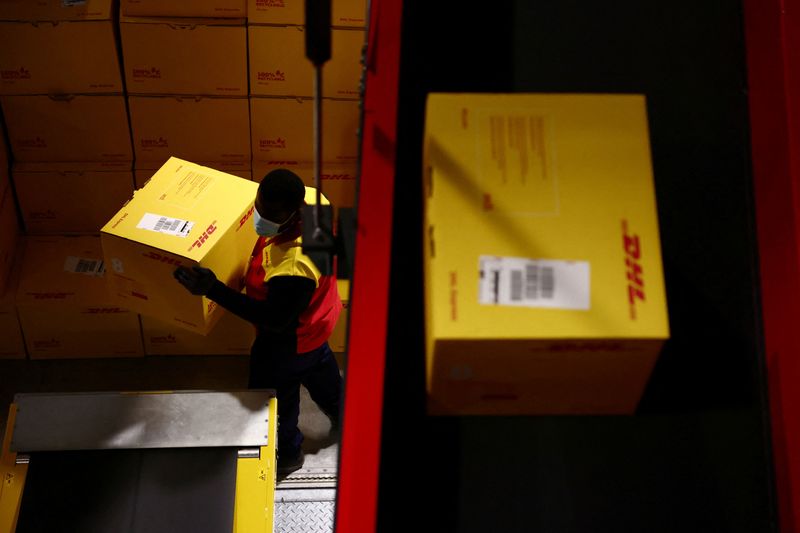Global cargo market sags as softer economy points to gloomy Christmas
2022.09.16 04:47
[ad_1]
2/2

© Reuters. FILE PHOTO: An employee carries a delivery package inside the new DHL Express hub of German postal and logistics group Deutsche Post DHL at the Roissy Charles de Gaulle airport in Tremblay-en-France near Paris, France, October 5, 2021. REUTERS/Sarah Meyss
2/2
By Jamie Freed and Sayantani Ghosh
SYDNEY/BENGALURU (Reuters) – Global trade bellwethers like FedEx (NYSE:) and Cathay Pacific Airways (OTC:) have cast a pall over the year-end holiday shopping season – the business slowdown they’re seeing points to weaker-than-expected consumer demand, not a Christmas bonanza.
The gloomy outlook comes as consumers globally struggle to cope with surging costs of food, fuel and housing. Even more spendthrift shoppers in China are tightening purse strings, sector watchers say, as the country’s harsh COVID-19 curbs have slammed the economy.
FedEx, which on Thursday withdrew a forecast it issued just three months ago, said a global demand slowdown accelerated at the end of August and was on pace to worsen in the November quarter.
The Christmas holiday season is usually frantic for air cargo and shippers moving newly launched smartphones, toys, and apparel from factories in Asia to the United States and Europe.
But Western retailers including Costco Wholesale (NASDAQ:) Group and Macy’s Inc (NYSE:) have found their shelves overflowing with unsold merchandise, suggesting they misjudged demand and are likely to be more cautious while restocking.
“The lack of a ‘freight wave’ from China’s re-opening was a negative sign for freight demand,” said J.P Morgan analysts, who downgraded FedEx stock to “neutral” from “overweight” on the outlook warning.
“It appears to have impacted FedEx first as the leading air freight carrier in the Asia-Pacific region.”
FedEx shares kidded 16% in New York on Thursday, pulling stock in logistics giant DHL’s owner, Deutsche Post (OTC:), 3.6% lower in their slipstream in early Frankfurt trade.
CHINA CHALLENGE
Hong Kong’s Cathay Pacific Airways has warned this year’s peak cargo season may be weaker than last year’s because of inflation and China’s zero-COVID policies. France-based transporter CMA CGM said weak consumer spending was curbing shipping demand and rates.
“Getting air freight into China remains challenging,” said Anthony Chung, a director at Auslink Marine, a Singapore-based family business that has been shipping seafood into China for 30 years.
Chung said the supply chain challenges hurting international air freight likely wouldn’t end until China eased curbs.
Reflecting a demand slump, ocean container shipping rates from Asia to the U.S. West Cost have slumped nearly three quarters since the start of the year to their lowest level since May 2020, according to booking platform Freightos Group.
Worldwide air cargo volumes fell 11% in the first full week of September from a year earlier, according to WorldACD Market Data, which said there were no clear signs yet of a revival.
The Baltic Air Freight Index powered by TAC data, which hit record highs in December on a pandemic-led peak season rally, has since slumped nearly 40%.
“Normally prices strengthen this time of year as traditional peak season approaches, but there is little sign of that happening yet,” TAC Index said in a weekly market update.
Deloitte forecast this week that U.S. holiday retail sales growth will slow sharply, hurt by “declining demand for durable consumer goods, which had been the centrepiece of pandemic spending.”
Still, people are spending on some goods and services such as cars and dining out though a surge in raw material prices and a still-raging semiconductor shortage have dampened sales.
[ad_2]
Source link








